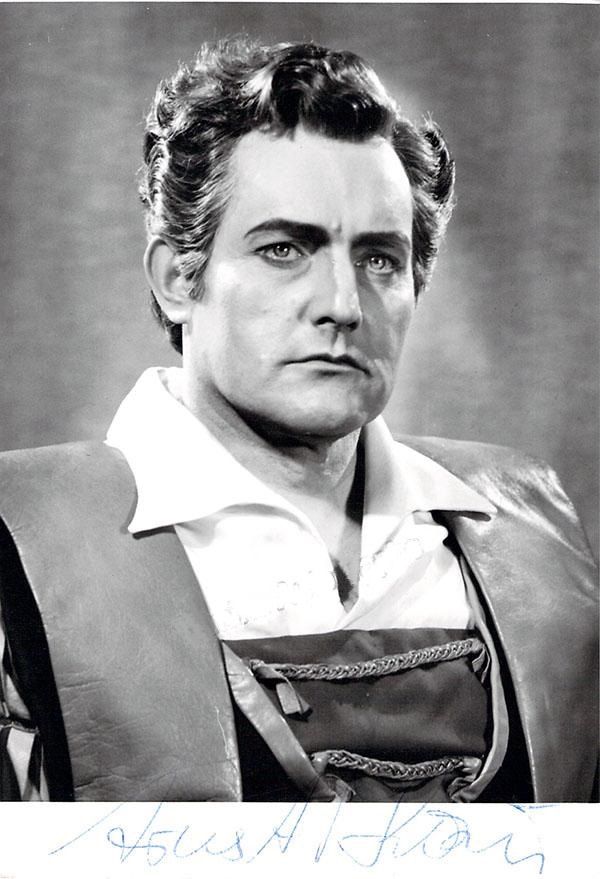It's unfortunate for Ernst Kozub that "The Voice", as a nickname, is firmly connected with
Frank Sinatra. In fact, it should be Kozub's nickname. People who have seen him on stage still raved about it decades later,
swearing that his was the most glorious voice that they had ever heard. Georg Solti said Kozub was one of the best heldentenors
of his life. And James King called him, in a letter to a record producer,
the best German tenor beyond doubt, stating that Kozub, when in top form, produced the most beautiful sounds that he had ever
heard from any tenor. Kozub had a first-class international career. And yet, the term "failure" is always lingering when his
career is – rarely enough nowadays – discussed.
Young Kozub was drafted into the Wehrmacht and sent fighting against the Soviet Union in WWII; wounded, he was deployed to
Thuringia behind the front lines, where he married, and stayed after the war was over. He worked as an insurance agent, and took
singing lessons just for fun; singing was his hobby, he never wanted to make it his profession. His voice teacher knew better,
and arranged his acceptance at the Weimar conservatory. Those were the years of the emerging German Democratic Republic; Kozub
made his debut in 1951 in Erfurt, and in 1952 was hired by Walter Felsenstein for his Komische Oper Berlin. From the beginning,
he sang a lot on the East German radio. In those early years, he sang roles like Châteauneuf, Rodolfo or Tamino.
In 1954 – leaving the GDR was not a problem back then – he was engaged by Georg Solti, who was opera director in
Frankfurt. Kozub would make Frankfurt and Hamburg the centers of his career; he was a member of the Frankfurt troupe until 1962,
then of the Hamburg troupe until his death, but in fact, he always sang in both cities (as a guest in the respective other one).
He quickly grew into the heroic repertory; he was still Rodolfo, but soon Riccardo, Luigi, Hoffmann, Erik, Don Carlo, Dick
Johnson; in 1959 and 1960, he sang his first performances as Parsifal, Florestan, Grigorij, Siegmund (in that role, he has very
few competition indeed) and Calaf. Later, he
added Tannhäuser (his most celebrated role), Stolzing, Max, or German.
Kozub was a passionate and very fast driver; in 1967, he had a grave accident and was injured. While he returned to the stage after
just a few weeks, he was left with a certain handicap. In 1970, his health deteriorated quickly; some say it was a consequence
of the 1967 accident, others say it was a heart condition, others again a rare and incurable disease. In fact, he obviously had
a rare heart condition, but the illness that broke out in 1970 and that led to his early death was leukemia.
He always made a lot of guest appearances: very often at the Maggio Musicale Fiorentino (from 1956), very often at Covent Garden
(from 1961, Solti was now chief conductor there), Deutsche Oper Berlin, Munich, Vienna Staatsoper, Düsseldorf-Duisburg,
Buenos Aires, La Scala, Rome, Torino, Palermo, Naples, Genova, Trieste (he loved Italy), Brussels, Monte Carlo, Barcelona... so
this was no doubt a great career, far indeed from being a failure.
So whence the notion of "failure", whence the carping also about his recordings that is common among a lot of collectors? He
was obviously a very inconstant singer; those who witnessed him report that when he had a bad evening, he was not just bad but
really, really bad. He had considerable difficulties studying his roles; Solti, who adored him, wrote in his autobiography that
it was tough for both of them when Kozub studied a new part, because he could either remember the words or the music, never both.
In 1962, it became too much; Solti had cast him in both Siegfried roles for his complete studio recording of Der Ring des
Nibelungen, but when Kozub showed up at the recording studio, he was just not up to singing his roles, and had to replaced
at last moment's notice by Wolfgang Windgassen. (But he did sing young Siegfried
on stage a few years later.) And not least, both some critics
at his time and some collectors today find his voice wooden and stiff at times, find fault with the fact that he rarely sang
piano, and criticize his inability to give his role portrayals any intellectual depth.
It's all true; he showed off his fantastic voice, and though he was too passionate to bore, he was certainly not a very nuanced
singer. Sometimes (very rarely, though), his voice may even sound wooden, ok. But hey, he was a heldentenor. And he was a 1950s
and 1960s singer. Does that ring a bell? It was the era of Del Monaco, Bastianini, Christoff, Beirer, Tebaldi, Nilsson, Fedora Barbieri. Nu-what? Nu-anced? Nuanced singing? What's that supposed to
be? In another way, if you compare him to German heldentenors... Ernst Kraus,
Knote, Kirchhoff, Pistor, Aldenhoff – can anybody seriously think that
Kozub was too wooden, or not nuanced enough in comparison? I think the idea that something went wrong with his career is
alimented by the imagination what would have had to become of a singer blessed with such a fantastic voice: a second Caruso,
a male Callas, a singer that will be a household name forever. Ok, that did not happen. He was also no second Winkelmann or Lorenz. But he was a versatile singer (very
proficient in the Italian repertory, too!) with a voice so stunning that if you've heard it once, you can never forget it. And
that's anything but a failure.
Reference 1: Kozub biography by Heiko Bockstiegel in: Stimmen die um die Welt gingen no. 72/December 2002; reference 2: HAFG CD liner notes by Klaus Ulrich Spiegel; reference 3

